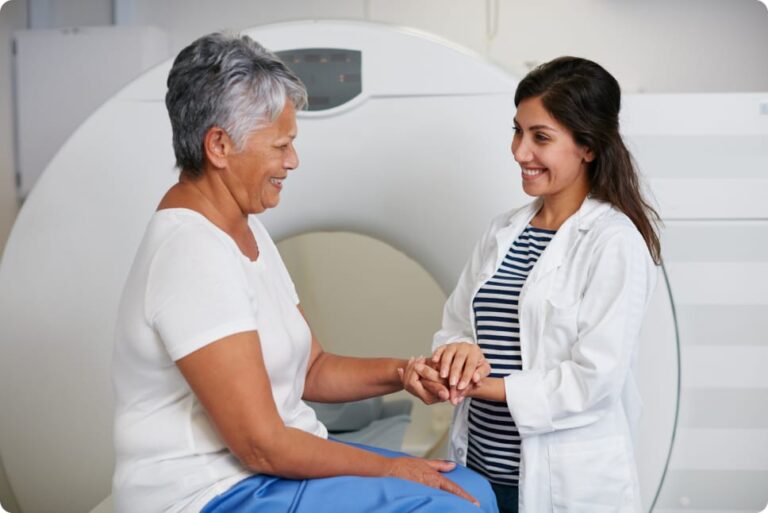When you suspect there’s something not quite right with your brain, it’s best to see your healthcare provider as soon as possible. If you are having an emergency, dial 9-1-1 immediately.
Your provider might recommend a brain CT scan. A brain CT is a kind of CT(computerized tomography) scan that can help your healthcare provider give you some answers about what’s going on, and what can be done about it.
Brain CT scans are commonly used in medical diagnosis and treatment planning. This type of imaging scan uses small amounts of X-rays to create detailed images of the brain and surrounding areas. Brain CT scans can help detect various conditions such as tumors, bleeding, infections, and other abnormalities in the brain. Let’s take a closer look.
What is a brain CT scan?
A CT scan of the brain is a noninvasive diagnostic imaging study that uses special X-ray measurements to produce horizontal pictures of the brain (also called slices).
Brain CT scans can provide more detailed information about brain tissue and brain structures than standard X-rays of the head, thus providing more data related to injuries and/or diseases of the brain.
Why did my healthcare provider order a brain CT?
There may be many reasons why your healthcare provider ordered a brain CT scan for you.
Brain CT scans are very helpful to look at various symptoms, injuries of the brain, or other conditions of the brain.
Brain CT scans can also greatly increase the effectiveness of future treatments that may be needed.
What can a brain CT scan help to diagnose?
By showing changes in brain structure over time, a brain CT scan can help diagnose various conditions, such as injuries to the head, bleeding, stroke, tumors, infections, hydrocephalus (enlargement of the brain with fluids), structural abnormalities, or degenerative diseases such as Alzheimer’s disease or Parkinson’s disease.
It’s important to know, however, that while CT scans can provide valuable insight, they may not always be the best type of imaging for certain conditions.
What preparations are required before my brain CT scan?
Before the brain CT scan
A brain CT scan might sound intimidating to some people, but in reality it’s non-invasive and takes just a few minutes. Plus it can save your life.
Make sure to follow the instructions your healthcare provider gave you.
Before a brain CT scan, let the healthcare team know if you have any medical conditions or allergies, or if you’re pregnant. Also, tell your healthcare provider about any medications you’re taking, as they might need to be adjusted before the scan.
Be sure to remove any metal objects or jewelry, as they can interfere with the imaging.
You might need to fast (not eat or drink) for a few hours before the procedure. Avoiding caffeine and alcohol before the scan is a good idea, as they can affect the results.
Wear comfortable, loose-fitting clothing without metal zippers or buttons.
Are there restrictions on eating or drinking before a brain CT?
There may be restrictions on eating or drinking before your scan. Your healthcare provider will let you know what those restrictions are. If, for some reason they don’t inform you, make sure to ask.
Is the radiation from a brain CT scan safe for most people?
CT scans use more radiation than regular X-rays.
Having several X-rays or CT scans over time may increase your risk for cancer. However, the risk from any one scan is very small.
Therefore, you and your provider should weigh this risk against the benefits of getting a correct diagnosis for a possible medical problem.

What should I expect during a brain CT scan?
During a brain CT scan, you will lie on a narrow table that slides into the center of the CT scanner. While inside the scanner, the machine’s beam rotates around you.
During your brain CT scan
Once you understand exactly what will happen during a brain CT scan, it doesn’t sound so frightening or overwhelming. Let’s look at what happens during a brain CT.
What will my brain CT scan feel like?
While the brain CT scan itself is painless, you will have to lie still for the length of the scan.
Be sure to let your healthcare team know if you ever feel discomfort or pain, and they’ll do everything they can to make you feel more comfortable.
How long does the brain CT scan take?
A brain CT scan usually takes about 15-30 minutes. Remember, the technologist will always be able to see and hear you during your scan.
After a brain CT scan
Once your brain CT scan is finished, you’ll probably have many questions. Let’s address some of those questions before your scan.
What can I expect immediately after the brain CT?
There should be no side effects after your CT scan, and you can go back to your normal routine.
If you have been given IV contrast dye before the scan, you may be asked to drink plenty of water for 24 hours after the scan. The water will help your kidneys flush out the contrast material from your body.
Is there anything I should avoid after my brain CT scan?
Every person is different but usually, after a CT scan of the brain, most patients will be able to resume their usual activities, diet, and medications.
Depending on your situation, your healthcare provider may provide additional or alternate instructions after the scan.
How and when will I know my CT results?
After a brain CT scan, it usually takes about one-to-two days to receive the results of your CT scan.
A radiologist will review your scan and your provider will discuss the results with you.
Make sure you ask your provider to communicate the results clearly and concisely so you will have a full understanding of the results.
How to schedule a brain CT appointment
Reach out to us at American Health Imaging, and we’ll help you schedule an appointment at an imaging center near you, today.
We’re here to help you get the answers you need.
Frequently Asked Questions About Brain CT Scans
What is a brain CT scan?
A brain CT scan is a medical imaging procedure that uses X-rays to create detailed pictures of your brain.
Why did my healthcare provider order a brain CT?
Your healthcare provider may order a brain CT to investigate symptoms, diagnose conditions, or assess the effectiveness of treatments.
What can a brain CT scan help to diagnose?
A brain CT scan can help diagnose conditions such as tumors, bleeding, brain injuries, and various neurological disorders.
What preparations are required before my brain CT scan?
Typically, no special preparations are needed, but your healthcare provider may give specific instructions based on your condition.
Are there restrictions on eating or drinking before a brain CT?
Generally, you can eat and drink as normal unless you’re instructed otherwise, particularly if contrast material is used.
Is the radiation from a brain CT scan safe for most people?
Yes, the radiation exposure is considered safe for most people, but it’s used cautiously in pregnant women and children.
What happens during a brain CT scan?What happens during a brain CT scan?
During a brain CT scan, you’ll lie on a table that slides into the CT scanner, which takes a series of X-ray images of your brain.
How and when will I know my CT results?
Your healthcare provider will discuss the results with you, typically within a few days after the scan, depending on the urgency and your provider’s protocol.
